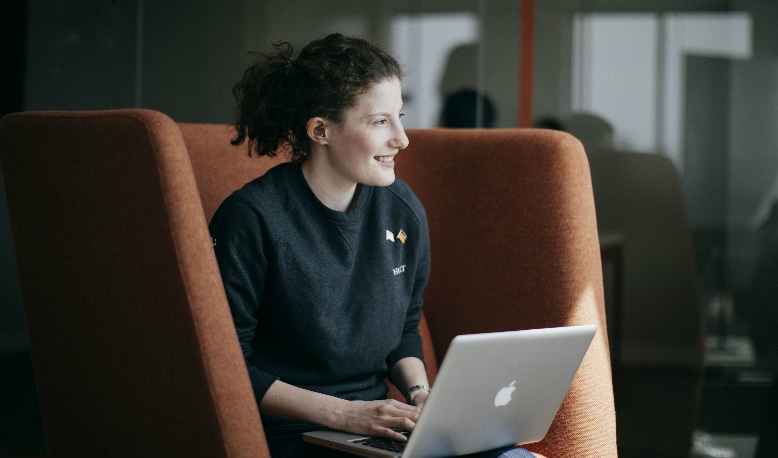Hult undergraduate Sophia Fries shares her story of overcoming the challenges of a hearing disorder and finding an inspiring “can-do” environment on campus in London.
I was born with a congenital hearing disorder. In other words, the bones inside my right ear are small and stiff, so they can’t move enough to for me to hear anything more than very loud sounds. My left ear is better, but it also has some problems with hearing loss. Therefore, I wear hearing aids in both ears. With these hearing aids, I can hear and understand things almost as well as anyone else.
It has been a long process to get to this point. Over the years, I have had several surgeries, different hearing aids, and numerous appointments. There have been times where I have had to go without my hearing aids while my ears healed and I couldn’t hear at all. Some people understand hearing impairments, but many others do not. Reactions have included: pity, staring at my ears, excluding me, and being afraid of the hearing aids.
Challenges at school
In elementary school I did OK. Depending on the teacher and the other students, I either had special arrangements or was left out. Some teachers put me in the back of the room, even after getting a doctor’s order that I should sit in the front. One teacher was afraid of my hearing aids and portable speaker because she also had a hearing problem that she chose not to do anything about. She told my mother that giving me a hearing aid would be the worst thing she could do for me. Fortunately, Mom did not listen to that advice!
A lot of the time, I did feel left out and others didn’t understand me because I didn’t hear and answer them. I couldn’t hear a lot of what was said, particularly when there was noise around me—and there is always noise in a school! High school was a challenge because the classes were really big and very noisy. Plus, the teachers did not have the time to accommodate my needs—it was easier and faster for them to deliver a lecture orally with their backs to me than to write things on the board and face my way when talking.
A turning point in high school
When I heard about a high school for children with hearing difficulties I transferred there. It was a hard decision as it meant moving away from home, but I decided it would be best in the long term and I knew that I could travel home on the weekends. This was the right decision and a turning point in my life.
Instead of being surrounded by a “can’t do” attitude from other people, I was surrounded by students and teachers that understood me and my ears. They told me how great I had done to get to where I was and they fostered what was inside of me with positive feedback. This was an experience that bolstered my self-confidence. In turn, I made sure to tell the other students who didn’t like their hearing aids just how lucky we are to have them!
Many people with disabilities hate the things they have to do to compensate for their problems. They don’t like their glasses or their cane or their shoe inserts and they put them away or lose them. When I first got my hearing aids, I didn’t cry or get angry—I laughed and laughed. I was overjoyed at what I could hear and never hated my hearing aids.
Deciding to study business
After high school ended, I knew that I wanted to go to a smaller, private school to study business. Through a friend, I heard about Hult International Business School in London. The more I learned about Hult the more I liked it. It was not only well-accredited, it was also smaller and the people were very positive and friendly from the start.
I knew that it was going to be a challenge to get accepted, but I have learned that you don’t get anything if you don’t try. I applied but did not mention my hearing problem until after my final interview because I wanted to be accepted on account of my merits and not my disability. Happily, I was accepted at Hult and other schools, but Hult was my first choice.
“I think that the students at Hult come from such different backgrounds that me being hearing impaired is no more of an issue than me being a dual American/German citizen. It is just another facet of my personality and they accept it.”
Finding a home at Hult
I knew that Hult was a good fit from the time I arrived. The people at Hult have a very positive “can do” attitude and are natural achievers. I really appreciate this fact because I am, by nature, a motivated person. I have had to be to overcome the challenges of not hearing, broken hearing aids, ear infections, colds, operations, and having to strain to hear.
What’s also fantastic at Hult is that, even though the people here are striving according to very high standards, they are still positive towards others and want to help where they can. I find that I can openly discuss my problem with people at Hult and they accept it. I think that the students at Hult come from such different backgrounds that me being hearing impaired is no more of an issue than me being a dual American/German citizen. It is just another facet of my personality and they accept it.
Support on campus
The professors at Hult are very understanding about my hearing problems. They realize that sometimes, no matter how much I want to, I just cannot hear. I may need things written out, a one-on-one talk, or another arrangement. Because of my hearing problems, I have to listen intently and that is physically draining. After an hour and a half, I need a “hearing break” of about 15 or 20 minutes. This too has been accepted.
Even though Hult is wonderfully designed, not all rooms are created equal. Some rooms echo, others dampen certain sounds, and others have background noises. In some rooms, I can hear much better than in others, so Hult approached me to ask for information about the acoustics. I even consulted with an architect about it.
Advice for others
The advice I would give is to someone struggling is: accept what you cannot change. If you have to wear hearing aids then be glad that you can have them. There are many people in the world who cannot afford to get the hearing aids they need. So, even though yours are a bother, realize that you are lucky to hear. Think of your favorite sound and then just imagine never hearing it again!
Also, find or build yourself a support system. Look for people that can give you care for your ears and also for your spirit. Then, use your aids to help you do what you want to achieve. Things will not always be easy or good—rooms are noisy, colds come, hearing aid batteries get empty, and not everyone will understand your problems. But, if you don’t put your hearing aids on and reach out to people and to life, then you are causing yourself to miss out on your own opportunities.
“Things will not always be easy, but if you don’t reach out to people and to life, you are causing yourself to miss out on opportunities.”
If you would like to find out more about the diversity and supportive environment on Hult’s global campuses, download a brochure here


Sophia Fries is a Class of 2018 Bachelor of Business Administration student at the Hult London campus. Born in Boston, Massachusetts and raised in Cologne, Germany, she’s a dual German-American citizen and a Hult Global Ambassador.
Kickstart your career with Hult’s undergraduate business school. To find out more, take a look at our blog 5 top tips for a standout undergraduate application. Download a brochure or get in touch today to find out how Hult can help you to learn about the business world, the future, and yourself.


